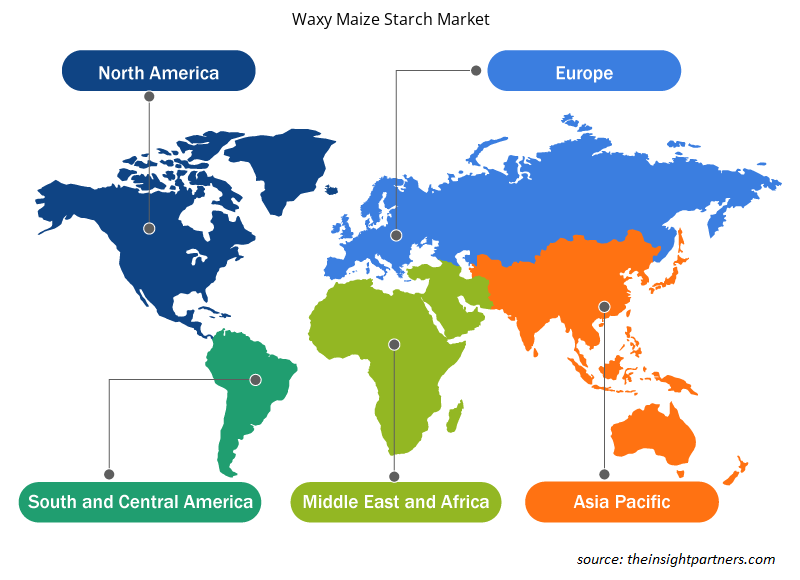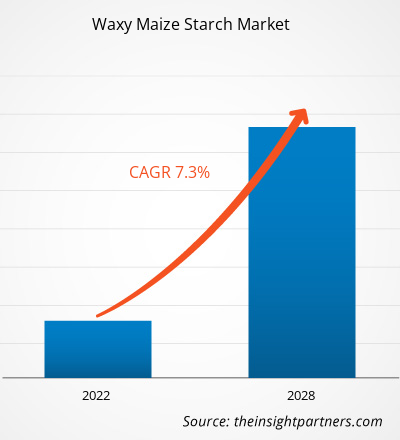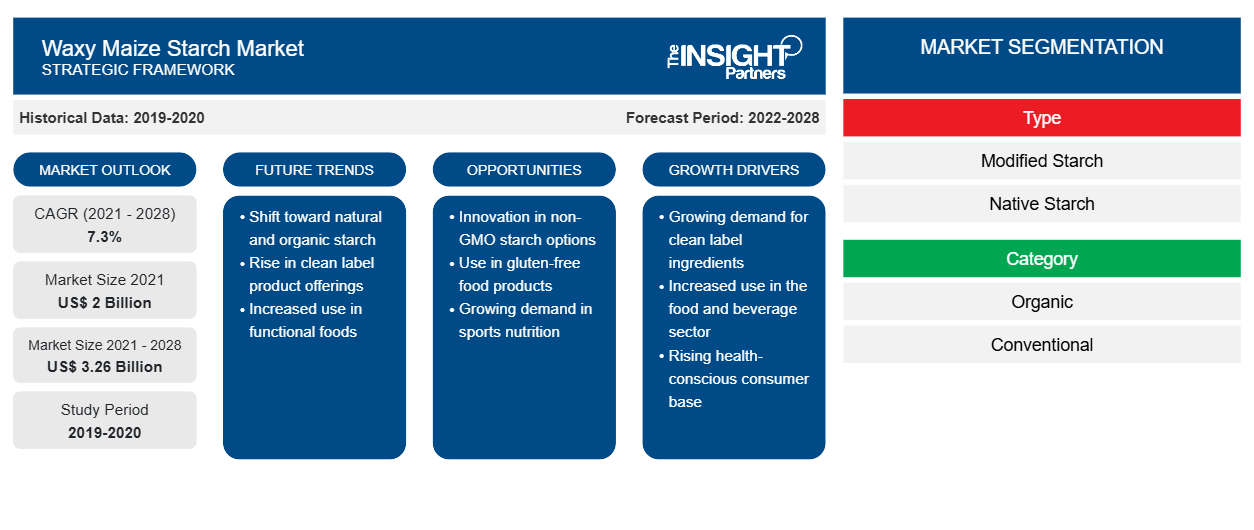تقدر قيمة سوق نشا الذرة الشمعية بـ 2،000.68 مليون دولار أمريكي في عام 2021؛ ومن المتوقع أن ينمو بمعدل نمو سنوي مركب قدره 7.3٪ من عام 2022 إلى عام 2028.
نشا الذرة الشمعي هو كربوهيدرات معقدة مشتقة من الذرة. يتم استخدامه كمادة مضافة في مختلف الصناعات النهائية، مثل الأغذية والمنسوجات والأدوية. يتم إضافته إلى الخيوط الفردية لزيادة القوة الميكانيكية ومقاومة الاحتكاك ومقاومة تغلغل الرطوبة. كما أنه يعمل كمثبت وحشو للحبر الملون عند طباعة الأقمشة. ارتفع استهلاك نشا الذرة الشمعي بشكل كبير في صناعة الأغذية، حيث يتم استخدامه كعامل تكثيف في الحساء والمرق وحشوات الفطائر واليخنات والطواجن والصلصات بسبب قدرته العالية على امتصاص الماء. من المرجح أن ينمو سوق نشا الذرة الشمعي بشكل كبير في المستقبل القريب بسبب خصائصه الوظيفية، مثل الرغوة والتجلط، مما يجعله مادة مضافة حيوية لمختلف الصناعات النهائية.
استحوذت منطقة آسيا والمحيط الهادئ على أكبر حصة في سوق نشا الذرة الشمعي في عام 2021، في حين من المتوقع أن تنمو المناطق النامية الأخرى، مثل الشرق الأوسط وأفريقيا، بشكل كبير في فترة التوقعات. يتزايد السوق بسبب قاعدة العملاء المحتملة للاقتصادات النامية مثل الصين والهند، وتفضيلات الناس الغذائية، والطلب المتزايد على المنتجات الغذائية الصحية والوظيفية. يتم استخدام نشا الذرة الشمعي على نطاق واسع في قطاعات تصنيع الأغذية والمشروبات والمنسوجات والورق لتثبيت المنتجات واستحلابها وكعامل ربط مسحوق في صناعة الأدوية. وفقًا لجمعية صناعة النشا الصينية، تم إنتاج 39.17 مليون طن من نشا الذرة في الصين في عام 2021. ومن المتوقع أن تعزز كل هذه العوامل نمو سوق نشا الذرة الشمعي خلال فترة التوقعات.
قم بتخصيص هذا التقرير ليناسب متطلباتك
ستحصل على تخصيص لأي تقرير - مجانًا - بما في ذلك أجزاء من هذا التقرير، أو تحليل على مستوى الدولة، وحزمة بيانات Excel، بالإضافة إلى الاستفادة من العروض والخصومات الرائعة للشركات الناشئة والجامعات
-
احصل على أهم اتجاهات السوق الرئيسية لهذا التقرير.ستتضمن هذه العينة المجانية تحليلاً للبيانات، بدءًا من اتجاهات السوق وحتى التقديرات والتوقعات.
تأثير جائحة كوفيد-19 على سوق نشا الذرة الشمعي
جلب جائحة كوفيد-19 تحديات غير مسبوقة للعديد من القطاعات في أوائل عام 2020. فقد أعاقت عمليات التصنيع عمليات الإغلاق والقيود الحدودية وحظر السفر ووقف التصنيع وغيرها من تدابير السلامة التي اتخذتها الحكومات وفقًا لإرشادات منظمة الصحة العالمية ووزارات الصحة الوطنية. ومع ذلك، في عام 2021، استأنفت العديد من الاقتصادات والصناعات عملياتها حيث أعلنت العديد من حكومات البلدان المختلفة عن تخفيف القيود المفروضة سابقًا. سُمح للمصنعين بالعمل بكامل طاقتهم، مما ساعدهم على التغلب على فجوات الطلب والعرض وغيرها من التداعيات. علاوة على ذلك، يركز مصنعو نشا الذرة الشمعي على زيادة إنتاجهم لإحياء أعمالهم بحلول نهاية عام 2022.
رؤى السوق
زيادة التطورات الاستراتيجية من قبل كبار اللاعبين في السوق
يقوم مصنعو نشا الذرة الشمعي بإجراء تطورات استراتيجية، مثل ابتكار المنتجات وتوسيع سعة المصنع وعمليات الدمج والاستحواذ، لتعزيز مكانتهم في السوق وتوسيع قاعدة عملائهم. على سبيل المثال، في سبتمبر 2021، استثمرت شركة AGRANA Beteiligungs-AG، إحدى أبرز الشركات المصنعة للنشويات ومكونات الأغذية الأخرى، 24.87 مليون دولار أمريكي في توسيع مصنع تصنيع النشا المتخصص في جميع أنحاء النمسا. يشمل النشا المتخصص الذي سيتم معالجته في المصنع النمساوي نشا الذرة الشمعي ونشا الذرة العضوي. مع توسيع سعة المصنع، تتوقع الشركة تلبية الطلب المتزايد على النشويات المتخصصة في جميع أنحاء النمسا والأسواق الأوروبية الأخرى. لذلك، من المتوقع أن توفر التطورات الاستراتيجية المستمرة من قبل اللاعبين في السوق فرصًا هائلة لسوق نشا الذرة الشمعي خلال فترة التنبؤ.
رؤى مبنية على النوع
بناءً على النوع، يتم تقسيم سوق نشا الذرة الشمعي إلى نشا معدّل ونشا أصلي. ومن المتوقع أن يكتسب قطاع النشا الأصلي حصة سوقية أكبر خلال فترة التنبؤ. يستخدم النشا الأصلي على نطاق واسع كمُنسِّج ومُثبِّت ومُثخِّن من قبل مصنعي الأغذية والمشروبات. يمكن إضافته إلى مجموعة واسعة من المنتجات الغذائية، بما في ذلك منتجات المخابز والحساء والصلصات ومنتجات اللحوم المصنعة والوجبات الخفيفة والمشروبات الكحولية وغير الكحولية والمزائج الجافة. علاوة على ذلك، يتم استخدامه كمكثف عالمي للدهانات والطلاءات المختلفة. في إنتاج مواد لاصقة للملصقات، يُظهر النشا الشمعي الأصلي قدرة لاصقة متزايدة عند العمل على الآلات عالية السرعة. تعد Cargill Incorporated وRoquette Frères وTate and Lyle من الشركات الرائدة في تصنيع نشا الذرة الشمعي.
رؤى مبنية على الفئات
بناءً على الفئة، يتم تقسيم سوق نشا الذرة الشمعي إلى عضوي وتقليدي. من المتوقع أن يسجل القطاع العضوي معدل نمو سنوي مركب أعلى في السوق خلال فترة التنبؤ. إنه ذو جودة فائقة مقارنة بالذرة غير العضوية. لذلك، من المتوقع أن يزداد الطلب على نشا الذرة العضوي بسرعة في السنوات القادمة حيث يطلب العملاء منتجات طبيعية وعالية الجودة. في صناعة الأغذية، غالبًا ما يتم استخدام نشا الذرة الشمعي العضوي كمكثف. على سبيل المثال، يتم استخدامه كمستحلب في صلصة السلطة والوجبات الجاهزة والحساء وأطعمة الأطفال. بالإضافة إلى ذلك، يتم تصنيع المنتجات النباتية من نشا عضوي خالٍ من الكائنات المعدلة وراثيًا.
رؤى قائمة على التطبيق
بناءً على التطبيق، يتم تقسيم سوق نشا الذرة الشمعي إلى الأغذية والمشروبات والمكملات الغذائية والمستحضرات الصيدلانية والمكملات الغذائية وغيرها. ومن المتوقع أن يسجل قطاع المستحضرات الصيدلانية والمكملات الغذائية أعلى معدل نمو سنوي مركب في السوق خلال فترة التنبؤ. كما يتم استخدام نشا الذرة ومشتقاته في التركيبات الموضعية، مثل المراهم والمستحضرات. يتم استخدامه في أشكال جرعات مختلفة، بما في ذلك الأقراص القابلة للبلع والكبسولات الصلبة والمخاليط والحبيبات والحبيبات الجاهزة. غالبًا ما يتم استخدام عجينة نشا الذرة بتركيز 5-20٪ في تصنيع الأقراص لتعزيز قدرة التركيبة على الارتباط.
إن اللاعبين الرئيسيين العاملين في سوق نشا الذرة الشمعي هم شركة كارغيل، إنكوربوريتد؛ وتيت آند لايل بي إل سي؛ وأجرانا بيتيليجونجس-إيه جي؛ ومجموعة مانيلدرا؛ وروكيت فرير؛ وسينوفي إنجريدينتس؛ وتوكاي دينبون المحدودة؛ وسانوا ستارش المحدودة؛ ونيوزيلندا ستارش المحدودة؛ وساميانج كوربوريشن. وتشارك هذه الشركات في تطوير منتجات ذات مخاطر صحية أقل لتلبية اتجاهات المستهلكين الناشئة والالتزام بالأطر التنظيمية. كما تشارك في عمليات الدمج والاستحواذ وتوسيع الأعمال والشراكات لتوسيع حصتها في السوق.
نظرة إقليمية على سوق نشا الذرة الشمعية
لقد قام المحللون في Insight Partners بشرح الاتجاهات والعوامل الإقليمية المؤثرة على سوق نشا الذرة الشمعية طوال فترة التوقعات بشكل شامل. يناقش هذا القسم أيضًا قطاعات سوق نشا الذرة الشمعية والجغرافيا في جميع أنحاء أمريكا الشمالية وأوروبا ومنطقة آسيا والمحيط الهادئ والشرق الأوسط وأفريقيا وأمريكا الجنوبية والوسطى.

- احصل على البيانات الإقليمية المحددة لسوق نشا الذرة الشمعية
نطاق تقرير سوق نشا الذرة الشمعية
| سمة التقرير | تفاصيل |
|---|---|
| حجم السوق في عام 2021 | 2 مليار دولار أمريكي |
| حجم السوق بحلول عام 2028 | 3.26 مليار دولار أمريكي |
| معدل النمو السنوي المركب العالمي (2021 - 2028) | 7.3% |
| البيانات التاريخية | 2019-2020 |
| فترة التنبؤ | 2022-2028 |
| القطاعات المغطاة |
حسب النوع
|
| المناطق والدول المغطاة |
أمريكا الشمالية
|
| قادة السوق وملفات تعريف الشركات الرئيسية |
|
كثافة اللاعبين في سوق نشا الذرة الشمعية: فهم تأثيرها على ديناميكيات الأعمال
يشهد سوق نشا الذرة الشمعية نموًا سريعًا، مدفوعًا بالطلب المتزايد من المستخدم النهائي بسبب عوامل مثل تفضيلات المستهلكين المتطورة والتقدم التكنولوجي والوعي المتزايد بفوائد المنتج. ومع ارتفاع الطلب، تعمل الشركات على توسيع عروضها والابتكار لتلبية احتياجات المستهلكين والاستفادة من الاتجاهات الناشئة، مما يؤدي إلى زيادة نمو السوق.
تشير كثافة اللاعبين في السوق إلى توزيع الشركات أو المؤسسات العاملة في سوق أو صناعة معينة. وهي تشير إلى عدد المنافسين (اللاعبين في السوق) الموجودين في مساحة سوق معينة نسبة إلى حجمها أو قيمتها السوقية الإجمالية.
الشركات الرئيسية العاملة في سوق نشا الذرة الشمعية هي:
- شركة كارغيل المحدودة
- شركة تيت آند لايل المحدودة
- مجموعة AGRANA
- مجموعة مانيلدرا
- روكيت فرير
إخلاء المسؤولية : الشركات المذكورة أعلاه ليست مرتبة بأي ترتيب معين.

- احصل على نظرة عامة على أهم اللاعبين الرئيسيين في سوق نشا الذرة الشمعية
تقرير يسلط الضوء على
- اتجاهات الصناعة التقدمية في سوق نشا الذرة الشمعية لمساعدة اللاعبين على تطوير استراتيجيات فعالة طويلة الأجل
- استراتيجيات نمو الأعمال المعتمدة لضمان النمو في الأسواق المتقدمة والنامية
- التحليل الكمي لسوق نشا الذرة الشمعي من عام 2022 إلى عام 2028
- تقدير الطلب العالمي على نشا الذرة الشمعي
- تحليل القوى الخمس لبورتر لتوضيح فعالية المشترين والموردين العاملين في الصناعة
- التطورات الأخيرة لفهم سيناريو السوق التنافسي
- اتجاهات السوق وتوقعاته والعوامل التي تحكم نمو سوق نشا الذرة الشمعي
- المساعدة في عملية اتخاذ القرار من خلال تسليط الضوء على استراتيجيات السوق التي تدعم المصلحة التجارية، مما يؤدي إلى نمو السوق
- حجم سوق نشا الذرة الشمعي في مختلف العقد
- نظرة عامة تفصيلية وتقسيم السوق وديناميكيات صناعة نشا الذرة الشمعية
- حجم النمو في مختلف المناطق ذات فرص النمو الواعدة
- التحليل التاريخي (سنتان)، سنة الأساس، التوقعات (7 سنوات) مع معدل النمو السنوي المركب
- تحليل PEST و SWOT
- حجم السوق والقيمة / الحجم - عالمي، إقليمي، بلد
- الصناعة والمنافسة
- مجموعة بيانات إكسل
التقارير الحديثة
شهادات العملاء
سبب الشراء
- اتخاذ قرارات مدروسة
- فهم ديناميكيات السوق
- تحليل المنافسة
- رؤى العملاء
- توقعات السوق
- تخفيف المخاطر
- التخطيط الاستراتيجي
- مبررات الاستثمار
- تحديد الأسواق الناشئة
- تحسين استراتيجيات التسويق
- تعزيز الكفاءة التشغيلية
- مواكبة التوجهات التنظيمية























 احصل على عينة مجانية ل - سوق نشا الذرة الشمعي
احصل على عينة مجانية ل - سوق نشا الذرة الشمعي